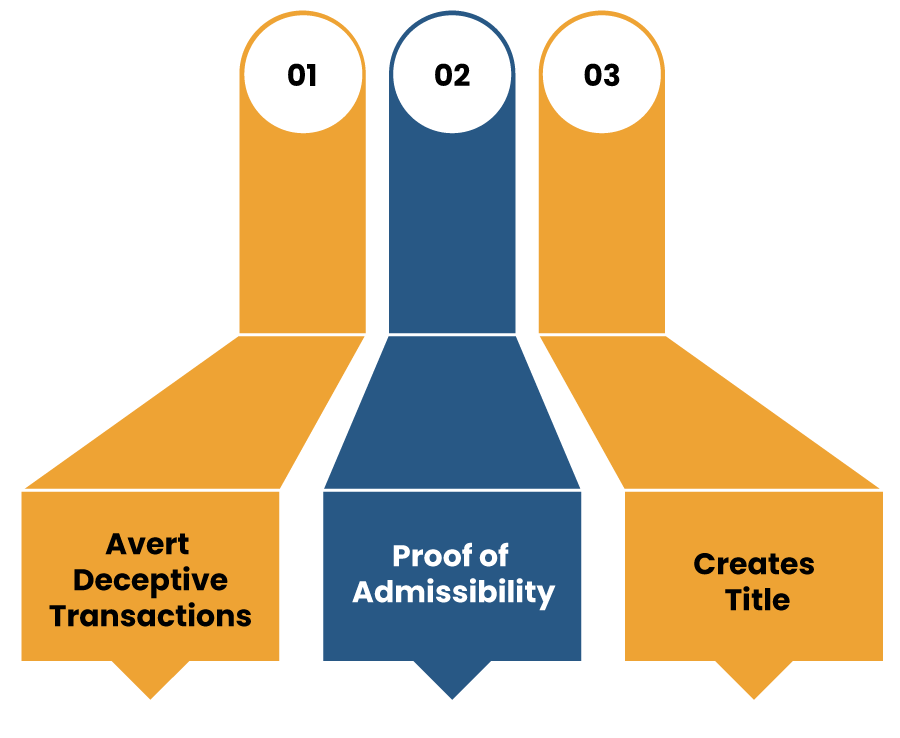The term “Sale Deed Format” is a legally-binding document that is required for authenticating the transaction regarding a property that occurs between seller and purchaser.
Such documents should stay in line with the provisions of section 54 of the Transfer of Property Act 1882. In this write-up, we will unfold the notion of the Sale Deed Format and define its process of drafting in detail.
How the Term “Sale” is Defined under the Law?
The term “Sale” implies the transaction of Transfer of Ownership against the set price, which is either dispensed or promised, or partly dispended or partly promised.
Under this, a seller intends to transfer the ownership of his/her property to another individual on an immediate basis. That implies if a transfer is made for an upcoming date, it will be regarded as an Agreement for Sale.
Understanding the Legal Purview of Sale Deed Format
The term Sale Deed is nothing but a legally-document that acts as legitimate proof of transfer and will enclose information’s regarding the Transfer of Ownership. Moreover, it is enforced on account of provisions of India’s Registration Act and is drafted on a Non-Judicial Stamp whose value differs from state to state.
The parties involved in a sale deed were known as Seller or Transferor and Buyer or Transferee. Furthermore, both parties must opt for deed registration within four months of execution & include their signature to comply with the terms and conditions.
Lastly, the sale deed is also being acknowledged as Conveyance Deed and Final Deed.
What Advantages does Sale Deed Offer to the Involved Parties?
The section below encloses the viable benefits of a sale deed format which are accessible to involved parties.


Avert Deceptive Transactions
A registered Sale Deed enables the governing authorities to keep track of the falsified transaction concerning properties.
Proof of Admissibility
A Registered Sale Deed adheres to evidentiary value. That implies both parties can set up the validity period and provide title to the document before the court of law.
Creates Title
A Registered Sale Deed creates the title over the new property owner. A Registered Sale Deed encloses the information regarding the cost of transferring the property, which will make the process of estimating tax easier.
What are the Key Particulars/Clauses of Sale Deed Format?
The essential particulars of a Sale Deed Format are as follows:-
- Parties Involved in the Sale Deed
- Description of the Property
- The Sale Consideration
- The clause regarding Payment method
- Advance payment and Installments
- Transfer of Title’ clause
- Delivery of the Deed and Possession of the property
- Indemnity Clause and the Encumbrance clause
- The clause regarding Payment method
- Advance payment and Installments
- Transfer of Title’ clause
- Delivery of the Deed and Possession of property
- Indemnity Clause and the Encumbrance clause
- Liability in case of a default
- Witnesses and Registration
- Right to quiet enjoyment of property
- Reddendum clause
- Tenendum clause
- Warranty clause (Ownership)
- Time is of Essence clause
- Right to call off the deal
- Dispute Resolution
What is the Process for Drafting and Registering a Sale Deed Format?
The steps regarding the process of drafting and registering a Sale deed Format are as follows:-
Discuss Requirements
In this step, the applicant must take advice from the experienced lawyer to ascertain a sale deed’s requisites.
Drafting of Sale Deed
Depending on the discussion, the lawyer will initiate drafting and complete the same in 3 to 4 Business Working Days. Post drafting, the lawyer will forward the draft back to the applicant for review and approval.
Printing of Sale Deed
After this, the lawyers will print the deed on a non-judicial stamp paper subjected to a value specified by the government[1].
Meeting with Sub-Registrar
The applicant shall require meeting the Sub-registrar in person, within whose jurisdiction the property is located.
Registering Sale Deed
Under this step, the applicant, in association with lawyer and witnesses, shall head over to the Sub-registrar office to sign the document and furnish the specified fees.
Issuance of Registered Sale Deed
In the last step, the Sub-Registrar will grant the registered Sale deed to the concerned applicant.
Who has to Bear Expenses Regarding the Execution of a Sale Deed?
Under the Execution of a Sale Deed, the buyer is accountable to bear the expenses such as Stamp Duty and Registration Fees. However, the seller needs to make sure that the entire property charges are already paid before the Final Sale Deed Agreement.
What Documents apply to Sale Deed Registration?
The documents applicable to Sale Deed registration are as follows:-
- Draft of a Sale Deed.
- Records of Rights, Tenancy, and Corp Extracts i.e., RTC
- Katha Certificate
- Mutation Register Extracts, if any
- Joint Development Agreement, if any
- General Power of Attorney
- Building Plan authenticated by the Statutory Authority.
- NOC (No Objection Certificate) from Water Works/ Electricity Department / Pollution Control Board/ Air Port Authority.
- Latest tax paid receipts, Latest electricity bill & receipt for the said property (in case of resale property)
- Allotment Letter from the Housing Board/ Co-Operative Society/ Builder.
- In case of a loan, legit Property Documents (original) are submitted with the Bank.
- Sale agreement with the seller.
- In case of property resale, copy of all past documents & NOC furnished by the apartment association.
What are the Mandatory Disclosures in a Sale Deed Format?
As per section 55 of the Transfer of Property Act, the parties involved with the sale deeds require making certain disclosures and representations regarding the immovable property in the Sale Deed.
In view of section 55 (1), the seller is required to make the following disclosures & representations:
- Material Defect involved with the Property
- Defect in Title of the seller.
- Third-Party claims
- Disputes associated with the property.
- Defects which the buyer cannot identify with usual care or prudence.
- To furnish all the documents regarding the seller’s title for examination.
- To answer every query raised by the buyer about the property.
- Execution of the sale deed or proper Conveyance after the payment of the amount.
- To take care of the property as well as documents till the property’s delivery date.
- Must furnish the property’s possession in the manner suitable for the buyer.
- To clear government-based charges and rent that build-up over time till the date of delivery of possession.
- Needs to ensure lien or Nil Encumbrance related to the property.
Conclusion
Lastly, we can conclude that the Sale Deed Format is a legally-binding document enforced post-execution of the sale agreement. The sale deed format allows the individual to transfer the property ownership in a way mentioned in bylaws.
The hostile takeover of the property is next to negligible under the paradigm of the sale deed-meaning- it is the safest way to transfer the property from one owner to another.
Read our article:Is Capital Gain Tax incapable of levying upon Registration of Sale Deed? Know-How!











